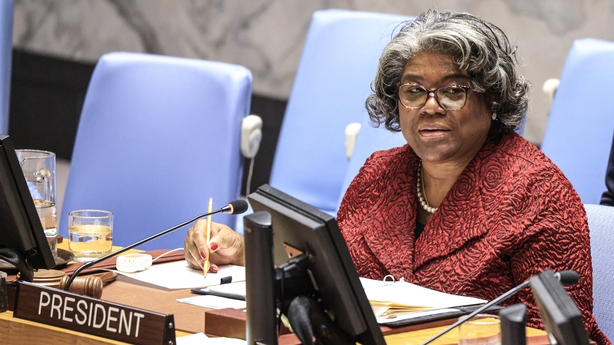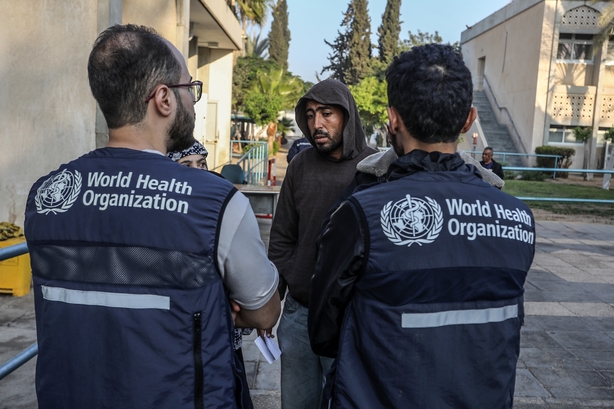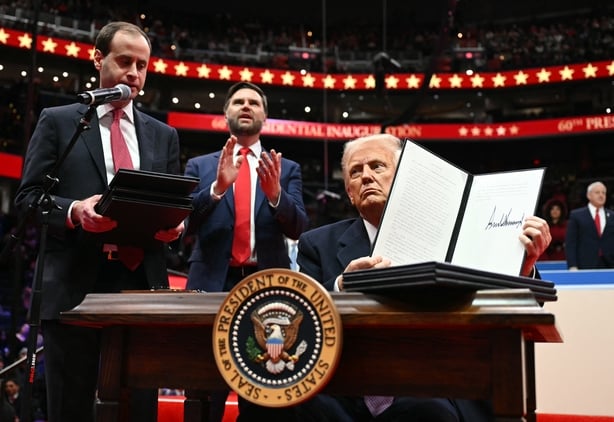The United Nations is bracing itself for the imminent arrival of President Donald Trump’s pick for US Ambassador, Congresswoman Elise Stefanik, who made it clear in her Senate confirmation hearing this week that her approach to multilateral cooperation will involve putting the US - closely followed by Israel - first.
"If confirmed, I will work to ensure that our mission to the United Nations serves the interests of the American people and represents President Trump's America First peace-through-strength foreign policy," she told senators.
The New York Congresswoman pulled no punches, telling senators she would be looking for value for money out of the 80-year-old institution - for the US, that is.
"The US is the largest contributor to the UN by far," she said, "our tax dollars should not be complicit in propping up entities that are counter to American interests, anti-Semitic or engaging in fraud, corruption or terrorism".
The US is indeed the largest contributor by far, although Ms Stefanik arrives with her country behind on its UN payments, to the tune of $2.8 billion.
Ms Stefanik started her political life on the more moderate wing of the Republican party but has since remodelled herself as "the leader of Trump’s front-line offence" in the US House of Representatives, said Anjali Dayal, assistant professor of international politics at Fordham University.
She has been one of the most vocal supporters of Israel’s war on Gaza and her comments at this week’s confirmation hearing indicated she would not be deviating from that position, once she takes up her post at UN headquarters in her native New York.
She vowed to tackle the "anti-Semitic rot" within the United Nations and said the US needed to be a "voice of moral clarity … for the world to hear the importance of standing with Israel", which she called the US's "most precious ally".

Ms Stefanik then dodged a direct question, from Democratic Senator Chris Van Hollen of Maryland, on whether Palestinians had the right to self-determination, answering instead: "I think it's a disgrace that Hamas and Hezbollah have stripped human rights of the Palestinian people and we need to ensure that we are standing up for human rights and that Israel is standing up for human rights".
Israel was a "beacon of human rights in the region," she added.
Pressed by Mr Van Hollen to state if she agreed with Israeli right-wing government officials that Israel had a "biblical right" to the West Bank, Ms Stefanik replied "yes".
"Peace and stability" in the region would be "very difficult to achieve...if you continue to hold the view that you just expressed," Mr Van Hollen responded.
It’s certainly a view that will put the incoming US Mission on a collision course with the UN Secretariat as well as the wider UN membership.
Just this week UN Chief Antonio Guterres, speaking at the World Economic Forum in Davos, warned that Israel was "emboldened by the military successes it has had" and now planned to annex the West Bank.
In September last year, the UN General Assembly overwhelmingly passed a resolution demanding that Israel "end without delay its unlawful presence" in the occupied West Bank.
Asked for his reaction to Ms Stefanik’s comments, a spokesperson for the UN Secretary General said: "The West Bank is part of the occupied Palestinian territories," adding "the future of the West Bank, Gaza, and the occupied Palestinian territories as a whole, needs to be dealt with through negotiations between the Israeli and Palestinian authorities".
The US mission to the United Nations under President Joe Biden was already largely isolated at the UN over his support for Israel’s bombardment of Gaza, following the Hamas-led attacks on 7 October 2023.
But there has long been a broad consensus among member states on the need to end settlement expansion and agree a "two-state solution".
"Colleagues, we reiterate our position that advancing Israeli settlements in the West Bank is an obstacle to the achievement of a two-state solution, the end state we all want to see, as we seek to bring the fighting in Gaza to a close," US Ambassador Linda Thomas-Greenfield said in one of her final speeches to the UN Security Council in December.
"Yet more settlement units were approved this past year than in any other 12-month period this decade," she said.
"We reiterate our belief that Israel’s programme of support for the expansion of settlements is inconsistent with international law and only serves to weaken Israeli security," she added.
But the new US president's unflinching support for Israel will come as no surprise to UN member states.
During his last term, Donald Trump moved the US Embassy in Israel to the disputed city of Jerusalem - a move widely condemned by other members states in a General Assembly vote.
Mr Trump instructed his then ambassador to the UN, Nikki Haley, to "take the names" of countries who voted against the US position.

UN members states can expect to see more of the same this bullish posture this time round.
"I would imagine states will have to consider whether efforts through the General Assembly are likely to bring the recriminations from the Trump administration," said Anjali Dayal.
Israel would be a key priority, Ms Stefanik promised senators.
But it won't be her only one.
She said she would also work with allies to "push back" against Chinese influence within the organisation.
"China has made inroads in placing CCP (Chinese Communist Party) leaders and Chinese diplomats in positions as heads of various sub-UN agencies, but also at the most junior level," she said.
But it was precisely because the US took a step back from the UN during President Trump’s last term, that China stepped forward into the breach, according to UN observers.
Ms Stefanik talked about increasing US engagement with UN technical bodies, tasked with things like telecommunications, artificial intelligence and civil aviation, again to counter China’s influence in shaping global norms.
Coincidentally, Ms Stefanik is likely to arrive just as China is taking up its presidency of the UN Security Council for the month of February.
But while the US strategy appears to be to lean into select portfolios at the UN, it's sharply pulling back from others - notably climate and global health - two areas where China is likely to assume leadership as a result.
On climate, the UN and the US will not see eye-to-eye.
Mr Guterres' remarks this week predicting the certain "end of the fossil fuel age" stood in stark contrast to Mr Trump's promise to "drill, baby, drill", as he pulled the US out of the Paris Climate Accords designed to curb global warming.
"Ooh, that’s a big one," said the newly-inaugurated president when he signed another executive order withdrawing the United States from the UN’s global health body, the World Health Organization.
Mr Trump has long accused WHO of parroting China’s propaganda at the beginning of the Covid-19 pandemic. He also called the organisation "corrupt", accusing it of ripping the United States off.
The US is - once again - the largest donor to the agency, contributing in excess of $1.2bn in 2022-2023.
Losing that money is going to hurt, plunging WHO into a deep freeze, said Richard Sullivan from the Centre for Conflict and Health Research at King's College London
"Job positions get frozen, any new initiatives are frozen, engagement is frozen," he said.

"So, any new initiatives simply will not happen at the moment, until people are certain about what is going to happen going forward," he said.
But all of this could drive necessary change.
"It's a chilling decision on the World Health Organization," Mr Sullivan said, "but in a positive light, it may provide the impetus to break the inertia so we can actually engage with some significant health and development reform."
In her confirmation hearing Ms Stefanik singled out other UN agencies, which could continue to enjoy US support - namely the children’s agency, UNICEF. and the World Food Programme. (The latter, notably, is headed by Cindy McCain, widow of Senator John McCain, who was no fan of Mr Trump.)
But she said she would enact a "full review of US spending" across the board.
For some UN members - and indeed officials - Ms Stefanik's arrival heralds an opportunity to shake things up.
"We must drive reform," she told senators.
Reform has been a priority for senior UN leadership for some time, declaring the organisation unfit for the challenges of the 21st century.
It could be a chance for them to "launder their dirty politics," said Ms Dayal, in other words: "making reforms that otherwise might have been unpopular, but that they can now frame as being required of them".
UN insiders take heart from the fact that the incoming US mission appears willing to work with the United Nations - an organisation in which Ms Stefanik said President Trump sees "great promise" - rather than adopting the "slash-and-burn" approach that many had feared.
But the underlying message is clear: Do something to upset Donald Trump and there will be consequences.







